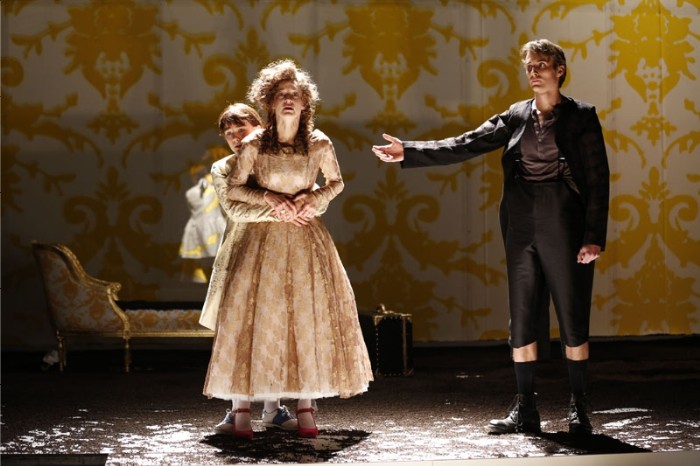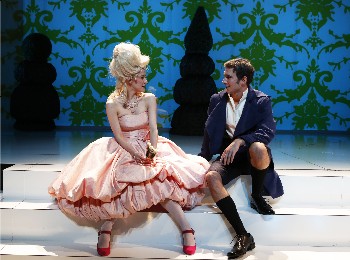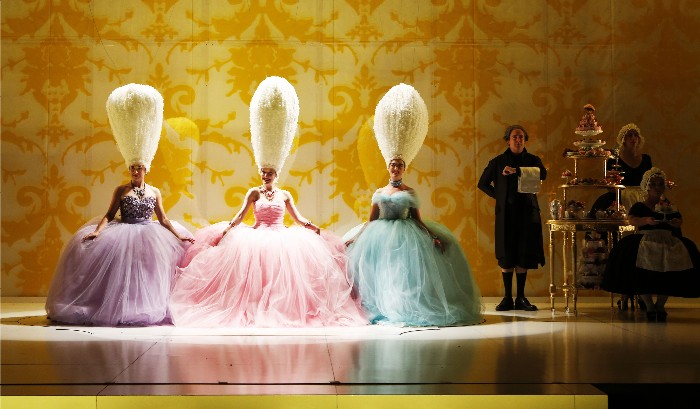Theater Review: “Marie Antoinette” — Let Them Eat Images
In its program, the A.R.T. links today’s 1% with the French aristocracy, a stab at relevance that does both the snobby thugs of the French Revolution and the super affluent of today a disservice. Say what you will about the 1%, but they aren’t stupid.
Marie Antoinette by David Adjmi. Directed by Rebecca Taichman. Choreographed by Karole Armitage. Co-produced by the American Repertory Theater and the Yale Repertory Theatre at the Loeb Drama Center, Cambridge, MA, through September 29.
By Bill Marx.
“Heads Will Roll” is plastered on the front cover of the American Repertory Theater program for its (and Yale Rep’s) world premiere production of Marie Antoinette. This is a play about the French Revolution so heads do roll, but do they always have to rotate the same way?
Dramatist David Adjmi, who authored the critically admired off-Broadway production of Elective Affinities, takes a surprisingly conventional look at the life of the doomed queen who casually suggested (allegedly) that her starving people eat cake. Yes, we have some fashionably kinky accents, from gowned royals spewing obscenities and a talking sheep to a sassy rap interlude (The Donkey Show kicks at the barricades), but generally there is little here that is fresh, that departs from the melodramatic MGM film version starring Norma Shearer as Marie. We are asked to laugh at the superficial spendthrift indifferent to the increasingly dangerous reality around her and then feel empathy for the martyr packed off to eternity without the benefit of humanity.
At least I think we are supposed to take this storyline earnestly; a morality tale about a girl from Austria raised to be a child-producing royal ornament. But given the play’s ersatz-tragic Shakespearean ending, which has the dying Marie envisioning herself becoming part of history, Ajmi may be angling for parody. Ultimately, Ajmi’s attitude to the historical material is a puzzle that you give up trying to figure out. The dramatist’s Marie is clueless but dutiful: the first half of the script is essentially a series of foul-mouthed sitcom sketches, ranging from the title character’s absurd appetites and degenerating popular image to hubby Louis XVI’s unusual sexual blockage and love of clocks. The second half turns much darker, with Marie, son, and hubby on the lam from the rebellious downtrodden, concluding with prison scenes, complete with tormenting revolutionaries, that attempt to generate some poignancy for the fallen rulers. Almost as an afterthought, Adjmi brings in some ghostly visitors to wage a cardboard thin debate with the arrogant-to-the-end Marie about the egalitarian power of democracy versus the inhumane rule of the God-chosen elites.
In its program, the A.R.T. links today’s 1% with the French aristocracy, a stab at relevance that does both the snobby thugs of the French Revolution and the super greedy of today a disservice. Say what you will about the 1%, but they aren’t stupid. At the very least, they are smart enough to be (or to hire) the most expensive and brilliant lawyers, managers, and financial advisers around, thus ensuring they gain more control at every downturn or uptick of the world economy. And really, what major regional stage company would mount a play that might actually alienate the 1%, whose generous contributions to the cause of art would undoubtedly be most welcome? Both sides of the mega-moneyed ideological divide—let’s say David Geffen and the Koch Brothers—would sit through this production undisturbed by thoughts of the downwardly mobile sharpening their blades. Marie is an example of the anachronistic rich, the blue-blooded dopes who didn’t know enough to rig the rules of the new game for their benefit. She is either to be laughed at or pitied. The 99% in the audience won’t be stirred into once again setting up Occupy camps.
As Marie Antoniette, Brooke Bloom does well by the myopic, comic braggadocio the part demands. Terminally anxious, sometime shill, sometimes gruff, her Marie is a tough-talking lowbrow who is in some ways an innocent because she has been bred to overlook reality. Most of the jokes stem from the hair-raising disconnect between her ditsy delusions of grandeur and what is actually going on around her. When the script calls for a more modulated attitude from Marie, such as bitter defiance against her vengeful jailers or genuine concern for her husband and child, Bloom can’t shed the trappings of caricature, though Adjmi doesn’t help much because you can’t tell whether he is sending the character up. The rest of the supporting cast are not given that much to work with, though Steven Rattazzi, as Louis XVI, has a moment or two when he is allowed to suggest that there is a suffering human being underneath the blithering buffoon, but it is too little much too late. The tragic aspect of this “tragicomic” play never materializes.

Marie (Brooke Bloom) is separated from her son (Andrew Cekala) by a guard (Brian Wiles). Photo: Joan Marcus
What takes its place in Marie Antoinette are engaging visuals. Director Rebecca Taichman, costume designer Gabriel Berry, set designer Riccardo Hernandez, and choreographer Karole Armitage have a lot of fun putting eye-catching frosting on this airy cake via three-feet-tall hairdos, deconstructed eighteenth-century costumes, bright colors, anachronistic music interludes, and herky-jerky dancing. The quartet inject enough playful bits and pieces of imagination into the proceedings to make them pass by amusingly enough, sometimes coming up with striking stage images. The sight of acres of dirt falling from the sky after the social order turns upside-down is terrific, as is the cameo of a carousel horse. I am not a big Enlightenment talking sheep fan, especially one who appears to be more enamored of Rousseau than Diderot, but Matt Acheson’s puppet is a lovable emissary of natural (?) facts.
Ironically, for all the talk about radical departures, Marie Antoinette suggests at least one major point of continuity between the Robert Brustein/ Robert Woodruff regimes at the A.R.T. and the theater under its current artistic director Diane Paulus. Then and now, when the dramatic meat and potatoes are watery gruel, the solution is to let them eat images.
Tagged: American Repertory Theater, Brooke Bloom, David Adjmi, Karole-Armitage, Marie Antoinette



My understanding is that Adjmi wrote Marie Antoinette during the Bush administration– and so he was not thinking in terms of the ideas popularized by the Occupy Movement — but in terms of Bush’s insensitivity in the face of the suffering caused both by Katrina and his inept response, as well as his general attitude of petulance and privilege.
Of course, that’s still too thin an idea to support a full-length play.
Hi Ian,
It doesn’t matter when the play was written. The best playwrights who wrote about the insensitivity of the rich and powerful created fascinating monsters: Jonson, Brecht, Shaw, and Shakespeare among them. The idea is make the arrogant affluent terrorists more than simply out of touch and flaky, but portray them as energetic, charismatic, smart, wily, etc. Marie may be Bush, but where is Bush’s brain? Where is the Dick Chaney or Karl Rove figure who is using her as a banal figurehead? A dramatist should combine the two polarities — if that isn’t done, audiences aren’t challenged because they have an easy comic figure to dismiss (as Marie is in this production) rather than a character whose use of power both repels and attracts.
British playwrights of the ’70s and ’80s (Howard Brenton, etc) created much more complex historical dramas that use the past to cast a scathing light on the present. My favorite — an overlooked masterpiece — is Peter Barnes’ The Bewitched — an astonishing poetic epic about Carlos II.
For a description of the play and its premiere, here is Martin Esslin’s review of the 1974 production. He is one of the few critics who got it. I didn’t see the RSC production, but Arthur Friedman did. It was his admiration for the play and the staging that sent me to the text, and it is a marvel. That script and Red Noses convinced me of the enormous power of Barnes’ work. The fact that he is an admirer of Jonson didn’t hurt.
Alas, The Bewitched is an expansive play with a large cast that has, to my knowledge, never been staged professionally in America. Middlebury College produced a student production of the script in 2006.
You’re absolutely right, Bill. Even if we do go with Adjmi’s inspiration of Marie Antoinette as George W. Bush, it doesn’t work. We can easily draw a caricature of Bush, citing his many grammatical and policy errors, as a moron elevated to prominence by privilege, but as he was quick to remind us, he was “the decider”: he chose courses of action, he believed certain things, he had ambitions and aims, and so the responsibility is was ultimately his. Marie Antoinette (at least in the play) has none of these qualities.
The funniest bits were actually the mistakes that occurred during Marie’s on stage costume changes the nights that I attended. While the responsibility for such a shallow script has to go to Adjmi, the fact that it was presented on such a major local stage reflected poorly on the decision making process at ART. It seemed like the LORT theatre equivalent of a B-grade Hollywood knockoff. I could easily imagine the meeting last year where someone said, “Hey, that Mary Zimmerman production of Candide that’s at the Huntington is making a killing at the box office. Do we have anything kind of French Enlightenmentish that won’t cost as much to produce for next year? i Oh, Marie Antoinette? And you say it has sheep and it name-drops Voltaire? If we insert a go-go dance sequence to remind people about The Donkey Show, it’ll be perfect!”